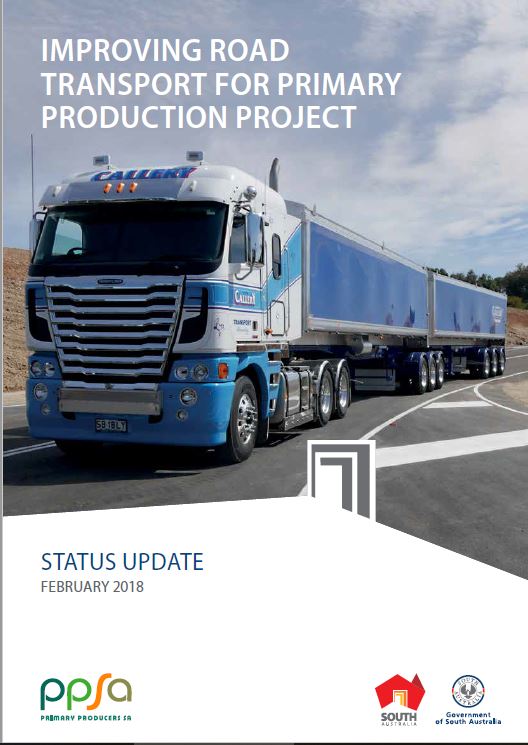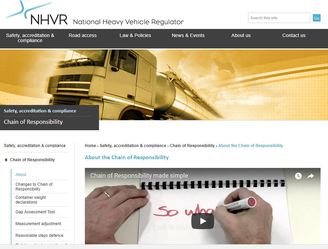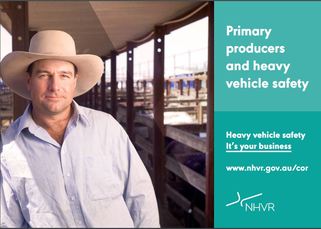New look for NHVR's National Agricutureal Notice Operator's Guide
The National Class 1 Agricultural Vehicle and Combination Mass and Dimension Exemption Notice Operator's Guide is the latest in the NHVR’s suite of more intuitive, user-friendly online operator’s guides for national road access notices.
A key difference from the previous PDF version is that the Operator’s Guide now includes the South Australian night travel conditions that were previously outlined separately in the Department of Infrastructure and Transport’s Night Travel for Agricultural Machinery and Night Travel for Rubber Tracked Tractors information bulletins, as well as the network conditions included in the Limited Access Locations in SA information bulletin. This eliminates the need for operators to cross-reference two websites. Click here to read the full update |
Transport Legislation
|
The 90 Day Change@SA project ‘Improving Road Transport for the Agriculture Industry’ identified opportunities to improve efficiencies in the state’s agriculture sector and is delivering significant benefits to primary producers and transport operators.
The project is a partnership between Primary Producers SA, Primary Industries and Regions SA and the Department of Planning, Transport and Infrastructure. The Wine Grape Council of SA is a key member of Primary Producers SA and has had significant input on the PPSA Transport Committee. In 2017, a second survey ‘Improving Road Transport for Primary Production’ was conducted, building on the success and momentum of the first project. The survey, which raised 90 issues, asked primary producers and industry groups to identify key issues affecting productivity. Click here to read the full update. |
Primary Producers SA Transport Committee

Following on from the most recent harvest, feedback from growers is that there isn’t enough information available regarding the changes to transport legislation. The two issues in particular surround the Chain of Responsibility (CoR) laws and the new National Heavy Vehicle Regulator.
To help growers better understand their obligations under transport legislation, we spoke to Sami Gilligan. Sami was appointed to the Primary Producers South Australia (PPSA) Transport Committee as the wine grape grower representative in 2017. He has over 18 years experience running various businesses (including transport) within the wine industry and is the go-to guy for wine and grape transport in McLaren Vale.
What is the purpose of the PPSA Transport Committee?
Our goal is to facilitate efficiencies in commodity freight. The committee is made up of five members from varying agriculture sectors and we all know how important transport is in the value chain.
We know how laws and regulations can have adverse effects on the logistics of primary producers and we aim to reduce these effects through advocacy and communication with the regulatory bodies.
We regularly meet with the Department of Planning, Transport and Infrastructure (DPTI) and the National Heavy Vehicle Regulator to assess regulations and laws and how they affect transport providers, primary producers and the general public.
What feedback are you getting from grape growers about the changes to transport legislation?
The biggest thing I’m hearing is that grape growers just want to know where they stand in regards to the changes. Growers want to know what their obligations are, who they need to talk to for permit requirements and how they can find out more information.
What is your advice to growers wanting to know more about transport legislation?
My number one piece of advice is, if in doubt, ask! And by that I don’t mean your neighbour or friends, ask the experts. Lisa at WGCSA is here to help growers, don’t hesitate to get in contact with her and she will find the information you need. ([email protected])
Regarding the Chain of Responsibility (CoR) laws, my advice to growers is to understand what they are doing in regards to transport and who they are employing. The best thing you can do is have open communication with everyone on your property in regards to working hours.
As for the National Heavy Vehicle Regulations, Primary Producers SA will be holding a number of workshops in conjunction with the National Heavy Vehicle Regulator to answer any questions or concerns primary producers have. Once again, keep an eye out for these through WGCSA communication.
How successful has PPSA been in improving the outcomes for primary producers with regards to heavy vehicle legislation?
We are actually in a great position with the National Heavy Vehicle Regulator (NHVR) thanks to the proactive approach from SA growers and producers. Not long ago we were bottom of the class for compliance and feedback. We are now at the top of the class and have developed a collaborative relationship with the NHVR.
The NHVR is open to feedback from SA primary producers and willing to take on our ideas. As a result, we have a lot of practical things happening to the benefit of producers.
We’re always looking to make recommendations to the government based on grower feedback. If you have any ideas or concerns, please let us know.
What benefits do you see for growers from this transport legislation?
I think once the NHVR is fully established growers will benefit from only having to go to once place for transport permits. At the moment it is a complicated system with growers having to go to multiple agencies for their permits.
The CoR laws will ultimately benefit everyone on the road with safer conditions for all drivers. I think once growers better understand where they stand, the system will be appreciated.
What resources can growers use to find out more information?
To help growers better understand their obligations under transport legislation, we spoke to Sami Gilligan. Sami was appointed to the Primary Producers South Australia (PPSA) Transport Committee as the wine grape grower representative in 2017. He has over 18 years experience running various businesses (including transport) within the wine industry and is the go-to guy for wine and grape transport in McLaren Vale.
What is the purpose of the PPSA Transport Committee?
Our goal is to facilitate efficiencies in commodity freight. The committee is made up of five members from varying agriculture sectors and we all know how important transport is in the value chain.
We know how laws and regulations can have adverse effects on the logistics of primary producers and we aim to reduce these effects through advocacy and communication with the regulatory bodies.
We regularly meet with the Department of Planning, Transport and Infrastructure (DPTI) and the National Heavy Vehicle Regulator to assess regulations and laws and how they affect transport providers, primary producers and the general public.
What feedback are you getting from grape growers about the changes to transport legislation?
The biggest thing I’m hearing is that grape growers just want to know where they stand in regards to the changes. Growers want to know what their obligations are, who they need to talk to for permit requirements and how they can find out more information.
What is your advice to growers wanting to know more about transport legislation?
My number one piece of advice is, if in doubt, ask! And by that I don’t mean your neighbour or friends, ask the experts. Lisa at WGCSA is here to help growers, don’t hesitate to get in contact with her and she will find the information you need. ([email protected])
Regarding the Chain of Responsibility (CoR) laws, my advice to growers is to understand what they are doing in regards to transport and who they are employing. The best thing you can do is have open communication with everyone on your property in regards to working hours.
As for the National Heavy Vehicle Regulations, Primary Producers SA will be holding a number of workshops in conjunction with the National Heavy Vehicle Regulator to answer any questions or concerns primary producers have. Once again, keep an eye out for these through WGCSA communication.
How successful has PPSA been in improving the outcomes for primary producers with regards to heavy vehicle legislation?
We are actually in a great position with the National Heavy Vehicle Regulator (NHVR) thanks to the proactive approach from SA growers and producers. Not long ago we were bottom of the class for compliance and feedback. We are now at the top of the class and have developed a collaborative relationship with the NHVR.
The NHVR is open to feedback from SA primary producers and willing to take on our ideas. As a result, we have a lot of practical things happening to the benefit of producers.
We’re always looking to make recommendations to the government based on grower feedback. If you have any ideas or concerns, please let us know.
What benefits do you see for growers from this transport legislation?
I think once the NHVR is fully established growers will benefit from only having to go to once place for transport permits. At the moment it is a complicated system with growers having to go to multiple agencies for their permits.
The CoR laws will ultimately benefit everyone on the road with safer conditions for all drivers. I think once growers better understand where they stand, the system will be appreciated.
What resources can growers use to find out more information?
|
About the Chain of Responsibility -
https://www.nhvr.gov.au/safety-accreditation-compliance/chain-of-responsibility/about Changes to the CoR laws - https://www.nhvr.gov.au/safety-accreditation-compliance/chain-of-responsibility/change-to-chain-of-responsibility CoR Gap Assesment tool - Use this to examine your business practices and systems controls against known risks and recognised best practice. https://www.nhvr.gov.au/safety-accreditation-compliance/chain-of-responsibility/cor-gap-assessment |
|
Primary Producers and Heavy Vehicle Safety
https://www.nhvr.gov.au/files/201802-0755-cor-primary-producers.pdf |




